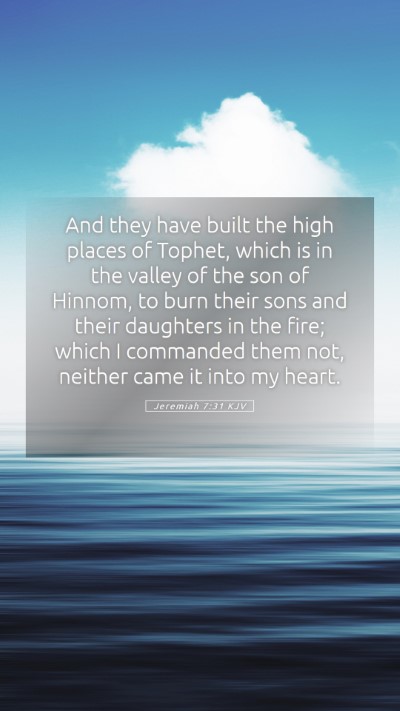Bible Verse Analysis: Jeremiah 7:31
Verse: Jeremiah 7:31 - "And they have built the high places of Tophet, which is in the valley of the son of Hinnom, to burn their sons and their daughters in the fire; which I commanded them not, neither came it into my heart."
Understanding Scripture: An Overview of Jeremiah 7:31
The profound implications of Jeremiah 7:31 resonate deeply within the context of biblical teachings and the fundamental requirements of faithfulness to God. This verse highlights the deviance of the people of Judah in their worship practices, specifically addressing their problematic sacrifices that go against God's commands.
Bible Verse Meanings and Interpretations
Commentators such as Matthew Henry and Adam Clarke interpret this passage as an illustration of the depths of idolatry and moral decay that had infiltrated the society of Judah.
- High Places of Tophet: These are symbolic of false worship and signify places where horrific acts, including child sacrifices, occurred, going against God’s will.
- Valley of the Son of Hinnom: Often associated with the idea of shame and its consequences, this valley becomes a graphic representation of the spiritual corruption during Jeremiah's prophetic ministry.
- Child Sacrifice: This act symbolizes the ultimate betrayal of God's commandments, demonstrating a profound neglect of God's teachings and the sanctity of life.
Scripture Analysis and Commentary Insights
According to Albert Barnes, this verse captures the essence of God's grievance with His people. Their actions reflect a blatant disobedience and a chilling departure from the covenant established with them. Such practices, as described in this verse, were entirely contrary to what God intended for His people, emphasizing how far they had strayed from His covenantal promises.
Additionally, Adam Clarke notes that this verse draws attention to the deep-seated iniquity that had encompassed the people. The Lord expresses sorrow that such abominable actions were even considered. This emphasizes God's disappointment and disillusionment with His creation, which has forsaken ethical commitments to worship and obedience.
Historical Context and Application
To understand the full impact of Jeremiah 7:31, it is essential to appreciate the historical and cultural context. During this period, Israel was surrounded by nations that practiced various forms of idol worship, including child sacrifices to gods such as Molech.
This verse serves as a prophetic warning, inviting readers to reflect on contemporary practices that might similarly stray from God’s commands. The text invites individuals to consider how the practices of our day might parallel those ancient rituals, calling for a return to genuine worship and dedication to God.
Additional Cross References
- Leviticus 18:21 - "And thou shalt not let any of thy seed pass through the fire to Molech, neither shalt thou profane the name of thy God: I am the LORD."
- 2 Kings 23:10 - "And he defiled Topheth, which is in the valley of the children of Hinnom, that no man might make his son or his daughter to pass through the fire to Molech."
- Ezekiel 16:20-21 - "Moreover, thou hast taken thy sons and thy daughters, whom thou hast borne unto me, and these hast thou sacrificed unto them to be devoured..."
Conclusion: Application in Daily Life
The insights gleaned from Jeremiah 7:31 encourage profound reflection on our personal faith journeys. Understanding the grievous nature of actions that we may normalize reminds us to pursue a heart aligned with God’s desires as outlined in scripture.
This analysis frames a springboard into how one might engage in Bible study groups or utilize online Bible study tools to discuss and understand the weight of scripture in a communal setting. The significance of such passages extends beyond mere historical narrative, compelling believers to evaluate their lives in light of God's unwavering expectations.
Final Thoughts
As we seek to comprehend the intricacies of biblical narrative through passages like Jeremiah 7:31, we are reminded of the necessity of returning to the core of God's directives, ensuring that our faith and practice align with His commandments. This verse acts not only as a historical account but as a timely admonition for spiritual integrity and obedience.


